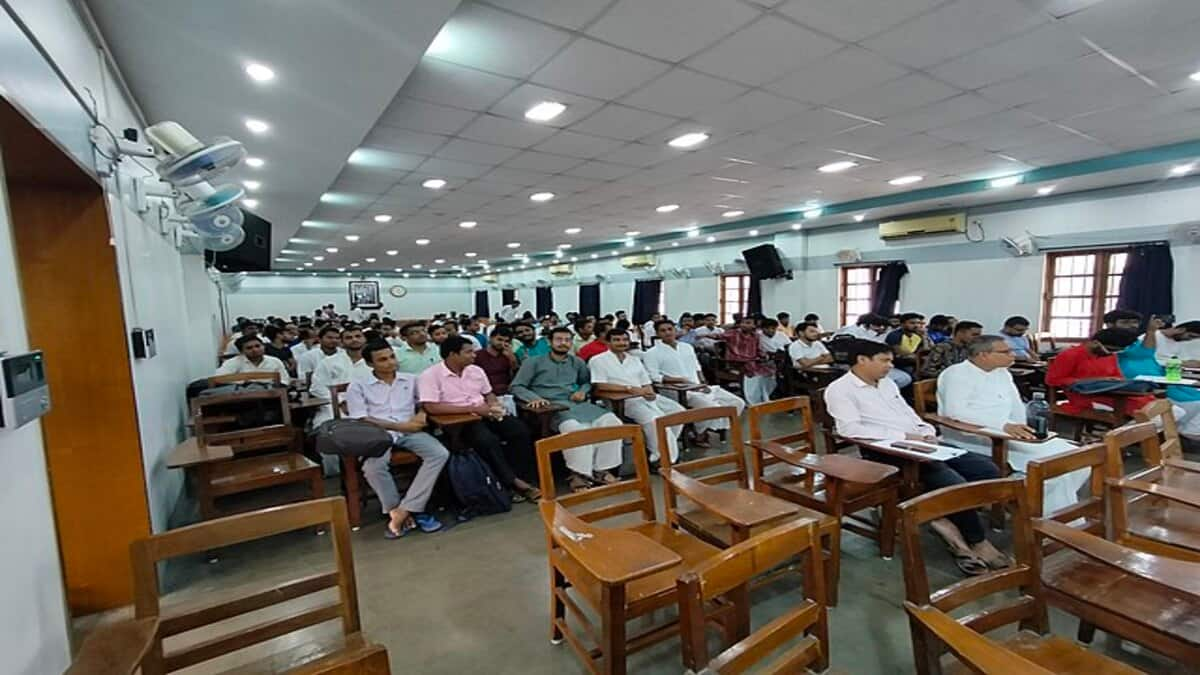They are opposing for sake of opposition: DU VC on three-language formula, NEP implementation
Press Trust of India | April 3, 2025 | 05:41 PM IST | 3 mins read
"The National Education Policy emphasises three languages -- one is the mother tongue, and students can choose any two other languages. The focus remains on the mother tongue, but the choice is open," DU VC told PTI.
Colleges/Universites Accepting CUET Score
Download list of Colleges/ Universities Accpeting CUET/CUCET Score with Cut-OFFs
Download Now
NEW DELHI: Delhi University Vice-Chancellor Yogesh Singh has strongly defended the three-language formula proposed under the National Education Policy (NEP), dismissing criticism as politically motivated. In an exclusive interview with PTI, Singh said opposition to the policy is not based on academic concerns but rather on resistance to necessary educational reforms.
Latest: Check DU PG Seat Allotment 2025 | Vacant Seats for Spot Round 4
DU PG Spot Round 2025: First Cutoff | Second Cutoff | Third Cutoff
DU PG 2025: Third Cutoff | Second Cutoff | First Cutoff
Don't Miss: NIRF DU Colleges Ranking
"The National Education Policy emphasises three languages -- one is the mother tongue, and students can choose any two other languages. The focus remains on the mother tongue, but the choice is open," Yogesh Singh told PTI.
"There is no reason for unnecessary fear in southern India. Students should be free to select languages as per their expectations and choices. This policy is meant to empower students, not impose any language on them. It provides flexibility and broader linguistic exposure, which is beneficial in today's globalised world," he said.
New things are happening in the country's education system and this is a change, he said, adding that at times, it is difficult to accept the change because it also comes with a cost. Clarifying a common misconception, Singh highlighted the distinction between the medium of instruction and language study.
"The Delhi University admits students from across the country. Here, students take English as the medium of instruction and in some courses, Hindi is available as well. However, if a student wants to study in a language like Gujarati, Marathi or Kannada, we do not have the facilities to provide that. But universities in Karnataka, Maharashtra or Gujarat will offer these facilities.
Also read No concept of dropping out in higher education, multiple options for students: Minister
Nation Education Policy
Students should go where such options are available," he explained. He stressed that limiting students' choices is detrimental to their academic growth. "In the past, we restricted choices because we lacked the infrastructure. Now, with India making significant strides in higher education, there is no need for such limitations," Singh said. He strongly criticised those opposing the three-language formula without substantial reasoning.
"When we are not forcing students to study a particular language, there is no question of opposing it unnecessarily. They are opposing for the sake of opposition. I do not see any merit in that argument," he asserted. Beyond the language debate, Singh praised the NEP as a landmark reform that shifts focus from rote learning to skill development, critical thinking and interdisciplinary education.
"The National Education Policy is one of the most progressive frameworks India has seen in decades. It moves away from rote learning and focuses on holistic development," he said. The policy also advocates for greater integration of technology in education, a shift that Singh believes is crucial. "Technology-driven learning, digital resources and blended teaching methods will redefine education.
India's education system
Universities must adapt to these changes to stay relevant," he said. While some critics argue that the NEP lacks clarity in implementation, Singh dismissed these concerns as premature. "Any major reform faces initial resistance. The NEP is designed to benefit students and over time, its positive impact will be evident," he asserted.
On the issue of regional languages, Singh reiterated that the NEP actively supports linguistic diversity rather than undermining any language. "The policy allows the use of regional languages in primary education and encourages linguistic inclusivity. It does not impose any restrictions," he clarified.
As the NEP continues to roll out across the country, Singh remains optimistic that its long-term benefits will outweigh any initial scepticism. "This policy is a step towards making India's education system more globally competitive while preserving its cultural and linguistic heritage," he concluded.
Follow us for the latest education news on colleges and universities, admission, courses, exams, research, education policies, study abroad and more..
To get in touch, write to us at news@careers360.com.
Next Story
]SC invalidates appointment of 25,753 teachers, other staff in West Bengal schools
"In our opinion, this is the case where the entire selection process is vitiated and tainted beyond resolution. Manipulations and frauds on a large scale, coupled with attempts to cover-up, have dented the selection process beyond repair, the apex court said.
Press Trust of India